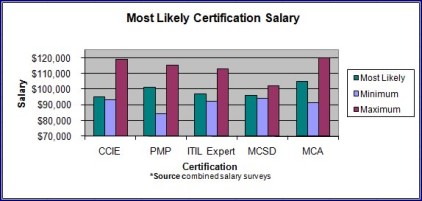 Technical certifications are a great way to achieve recognition in the technology field. However, with so much turmoil in the economy, certification may also be a way to advance your career or help keep your job. Deciding on which professional certification you should pursue depends on your interests and where you want to take your career.
Technical certifications are a great way to achieve recognition in the technology field. However, with so much turmoil in the economy, certification may also be a way to advance your career or help keep your job. Deciding on which professional certification you should pursue depends on your interests and where you want to take your career.
This article summarizes the top five widely recognized technical certifications going into next year. Some may argue that the PMP and ITIL certifications may not truly be technical, but they top the list since they are in high demand in the technology sector.
Number 1 – Project Management Professional (PMP)
The Project Management Institute (PMI) offers five project management certifications, which are all mutually exclusive and range in their requirements and degree of effort.
- Certified Associate in Project Management (CAPM)
- Individuals are generally part of the overall project team
- Certification requires the least amount of actual experience and formal education.
- A 3 hour exam is required; however it is less demanding than other PMI certifications.
- PMI Scheduling Professional (PMI-SP)
- This individual typically works with the PM team, stakeholders and others to develop the project schedule.
- Certification requires a significant amount of experience and formal training or education.
- The exam is 3.5 hours and the difficulty level begins to rise.
- PMI Risk Management Professional (PMI-RMP)
- These team members perform risk identification and mitigation tasks.
- The education, training and experience are slightly higher than the PMI-SP for certification.
- Similar testing as the PMI-SP
- Project Management Professional (PMP)
- PMP’s are generally the leaders of the projects.
- Certification requires a significant amount of education, training and experience.
- The exam is 4 hours, and you will need all that time to complete it.
- Program Management Professional (PgMP)
- The certification requirements are similar to a PMP, however this certification makes a distinction between Project Manager and Program manager.
- PgMP’s are responsible for several projects at one time and generally have PMPs that report to them.
- A PMP certification is not required for the PgMP, however the cost is three times that of the PMP test and builds on the foundation needed to pass the PMP.
My advice – go for the PMP certification. The PMP certification is widely accepted as the IT industry standard for project management. If you do not qualify to test for the PMP certification, then start small with CAPM, then quickly build your resume to qualify for the PMP. For more information, visit the Project Management Institute (PMI) at http://www.pmi.org/
Number 2 – ITIL Certification
The Information Technology Infrastructure Library (ITIL) is widely known for the formalization of the processes to run and manage technology operations. ITIL Version 3 certification is now released, and should be pursued if you are interested in leading or designing medium to large IT shops. ITIL v3 certifications come in four levels that build on each other.
- Foundation Level – IT Service Management
- Focuses on knowledge and comprehension to provide a good grounding in the key concepts, terminology and processes of ITIL.
- This is the starting point for all ITIL certifications. This certification introduces you to the ITIL terminology, an understanding of Service Support and Service Delivery, and overall comprehension of ITIL
- There is no prior education or experience requirement, and the exam is just one hour long.
- Many people from HR to IT become ITIL Foundation certificate holders.
- Intermediate Level – Lifecycle & Capability Stream
- There are two streams in the Intermediate level: Lifecycle and Capability.
- The Lifecycle stream includes 5 individual certificates built around service strategy, design, transition, operation, and continual improvement.
- The Capability stream includes 4 individual certificates focusing on operational support and analysis; service offerings and agreements; release, control and validation; and planning, protection, and optimization.
- The Intermediate Level is a battery of certifications, each gaining credit towards the expert certification. However each test is not overly difficult and can be less than 10 questions long.
- Certified individuals typically run and plan the Data Center operational activities.
- Expert and Master Levels
- Expert candidates must successfully complete, in addition to the Foundation Level, a number of intermediate units and the Managing Through The Lifecycle capstone course.
- ITIL Experts are typically the IT operations designers and trainers.
- The Master level is under development and will assess an individual’s ability to apply and analyze the ITIL concepts in new areas.
My advice: If you are going to make information technology your career, at least attain the ITIL Foundation certificate in IT service management.
Number 3 – Microsoft Certified Solutions Developer (MCSD)
Microsoft has a solution for everything, an application for everything, and a service for everything, as well as a certification for just about everything. The MCSD is the certification to get when it comes to industry demand for Microsoft development skills.
- Microsoft Certified Solution Developer (MCSD)
- The MCSD on Microsoft .NET certification is for Enterprise level application developers.
- To attain the MCSD, you must pass four core tests and one elective test. You have many choices of application focus to choose from, and pay special attention to the published retirement date of any test.
- The tests range in difficulty and are hard to quantify. Microsoft has deployed several test procedures that include adaptive testing as well as “Hot Area Questions” where you select an active element, “Drag and Drop questions” where you move the correct object to the correct area as well as many other interesting test practices.
My advice – if you are a developer and plan to make Microsoft your platform of choice, go for the MCSD certification.
Number 4 – Microsoft Certified Architect (MCA)
MCA certified individuals are often the people setting the IT strategies for the enterprise. This is a very select set of individuals and the certification process is extremely demanding. There are two MCA programs to choose from:
- MCA programs for technology-based architecture skills
- These programs focus on Microsoft based infrastructures, such as Windows 2008, Exchange, SQL, etc.
- Requirements include: (A) a 4 week training program; (B) weekly written and lab tests; and (C) passing a board interview.
- MCA programs for broad architecture skills
- These programs address mixed infrastructures, not just Microsoft technologies.
- Requirements are the same as the technology-based program; however the 4 week training program is not required nor offered.
My advice – pursue a MCA certification after gaining a few years of Microsoft and non-Microsoft experience and after becoming an expert in a specific technology discipline.
Number 5 – Cisco Certified Internetwork Expert (CCIE)
This is one of the most respected of all certifications and is still one of the most difficult and most labor intensive to attain. CCIE individuals are typically the ones that plan and manage enterprise networks.
- Cisco Certified Internetwork Expert (CCIE)
- This certification is for highly experienced IT networking professionals that have seen it all and are ready to prove it to Cisco.
- The exam is a 2 hour written test and an 8 hour lab exercise that include everything from setting up the network, to improving performance and troubleshooting problems. The lab has been described as an “event” similar to training for and coming in first for a triathlon.
My advice – if networking is your thing, sign up for a six month training program and get started now.
But why get certified at all?
These technical certifications can lead to more visibility, better opportunities, and higher paying jobs. In today’s increasingly complex, highly specialized, and competitive economy, professional credentials are everything. You know that you have the information technology skills and experience to do the job, but how do you convince potential employers and customers?
These top five IT certifications to grow or keep your job is a selected list from the hundreds of technical certifications available. Find the certification that interests you and correlates with your career interests. Finally, don’t get stalled at 80% complete – put in the effort to complete your training and take the exam, repeatedly if necessary. The personal satisfaction from a certification will be your first reward!
Jason A. Lochinger
http://www.linkedin.com/in/lochinger
 |


Great list of top certifications – I also belive that porject management and IT service management skills are highly in demand and can see a lot more training being carried out in those fields.